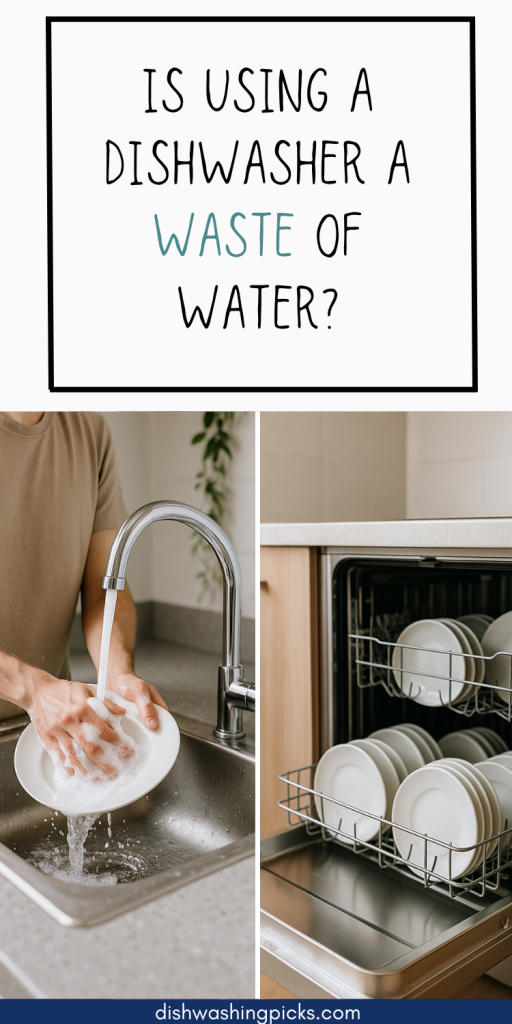
The Dishwasher Dilemma
Alright, be honest—have you ever stood at your sink, scrubbing a mountain of plates, and thought, “Is this actually better for the planet than just throwing everything in the dishwasher?”
You’re not alone. There’s this idea floating around that dishwashers are water-guzzling monsters. That running one means you’re wasting gallons upon gallons just for a few clean forks.
But is that really true?
Let’s bust some myths, clear up the facts, and help you decide what’s actually better—for your dishes and your water bill.
Let’s Get Real: How Much Water Do Dishwashers Use?
Okay, let’s throw some numbers around (don’t worry, we’ll keep it digestible):
- Older dishwashers (think pre-2000): could use 9–14 gallons per cycle. Yikes.
- Modern ENERGY STAR® models: typically use 3–5 gallons per load. That’s right—just 3 to 5!
Now compare that to hand washing…
- The average faucet flows at 2 gallons per minute.
- If you wash dishes for 10 minutes (and let’s be honest, it’s usually longer), that’s 20+ gallons—four times what a modern dishwasher might use.
So, spoiler alert: in most cases, using a dishwasher actually saves water. Yep. Shocking, right?
But What About Small Loads?
Great question.
If you’re tossing in three plates, a coffee mug, and calling it a day? Yeah, that’s probably wasteful—unless your machine has a half-load setting (some fancy ones do).
But here’s the magic of dishwashers: they use the same amount of water no matter how full they are (within reason). So, when it’s fully loaded and efficiently stacked, you’re getting way more bang for your water buck.
Pro tip: Wait until it’s full. It’s like doing laundry—half a load wastes water and energy, full load = efficiency win.
Real-Life Example: Imagine This…
Let’s say you host a small dinner party. Six people. You’ve got a stack of dishes: plates, glasses, cutlery, serving bowls. Total mess.
Option A: Hand-wash it all. That’s probably 25+ minutes of running water and some serious elbow grease.
Option B: Load the dishwasher, hit ‘Start,’ pour yourself a glass of wine, and chill. It’ll clean everything using 4 gallons—and you didn’t even break a sweat.
See where we’re going here?
Wait, Isn’t Electricity a Problem Too?
Absolutely—a dishwasher uses both water AND electricity, especially to heat that water. But again, newer models are built to be efficient on both fronts.
Plus, if your home has solar panels or you’re in a region with cleaner energy, the environmental impact of running a dishwasher drops even more.
And fun fact: using hot water to hand wash actually burns a surprising amount of energy, especially if you’re using a traditional electric water heater. So it’s not just about the water—you’ve got to look at the whole picture.
Myth-Busting Time: Hand Washing Isn’t Always Greener
This might hurt to hear if you’re a die-hard sponge warrior, but studies (yep, real science) show that most people use way more water hand washing than a dishwasher does.
Why?
- We let the tap run.
- We rinse before and after.
- We use too much soap, which takes more water to rinse off.
- We take our sweet time.
Unless you’re the kind of person who fills a basin with soapy water and washes every dish methodically—without rinsing under running water—you’re probably not saving water.
Sorry, Grandma.
How to Use a Dishwasher the Right Way
Want to be water-wise and still enjoy that sweet, hands-free clean? Here’s how:
- Only run full loads. Seriously, that’s rule number one.
- Skip the pre-rinse. Modern dishwashers are made to handle a little gunk.
- Use eco mode if your machine has it—it reduces water and energy use.
- Scrape, don’t rinse. Just get the big stuff off. No need to make each dish spotless beforehand.
It’s all about working with the machine, not doing its job for it.
Dishwasher vs. Hand Washing—Who Wins?
Let’s wrap this up like a freshly cleaned plate:
Is using a dishwasher a waste of water?
Not even close. In fact, in most situations, it’s the more eco-friendly option—especially if it’s a newer model and you’re using it smartly.
So if you’ve been feeling guilty about pressing that ‘Start’ button, go ahead and let that go. You’re not wasting—you’re winning.
And hey, if your dishwasher is more than 10–15 years old? It might be time to upgrade. Your wallet, your hands, and the planet will thank you.
